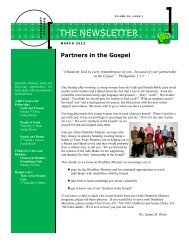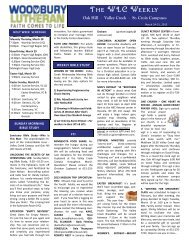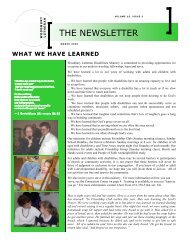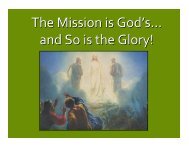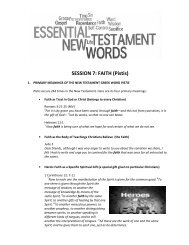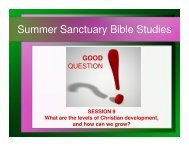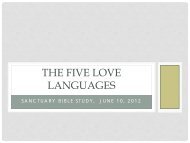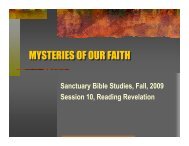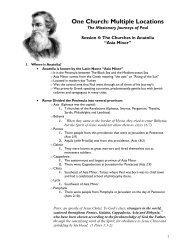Bible Study Handout: Pastor Dean Nadasdy - Woodbury Lutheran ...
Bible Study Handout: Pastor Dean Nadasdy - Woodbury Lutheran ...
Bible Study Handout: Pastor Dean Nadasdy - Woodbury Lutheran ...
Create successful ePaper yourself
Turn your PDF publications into a flip-book with our unique Google optimized e-Paper software.
1) Dangerous Memories of Jesus and His Agenda. Exilic Jews were encouraged by<br />
the stories of their faith that has been passed on orally for generations and<br />
written down as inspired Scripture – stories on the power and grace of God like<br />
the story of Abraham and Sarah. See Isaiah 51:1-2<br />
Like an experimental farm, the church is to demonstrate living in the Kingdom of<br />
God with generosity and selflessness in contrast to the greed and consumerism<br />
rampant in society. The secret to this is rediscovering<br />
remembering the stories of Jesus. Frost calls the reader<br />
to a fresh understanding of Jesus through first century<br />
Jewish eyes. For example, Jesus' eating patterns<br />
amazinglybroke down social barriers and demonstrated<br />
inclusiveness unheard of in Jewish religion of his day.<br />
Frost insists if we are to imitate Jesus, we will value<br />
hanging out with people in `third places' like clubs and<br />
hotels where people gather regularly and not get overly caught up in meetings<br />
and Sunday stuff (the usual barometer of Christian commitment).<br />
2) Dangerous Promises of God That Point to the Kingdom. Jews in the exile<br />
needed to cling to the promises of God. Those promises defined them as people<br />
who would not merely survive but thrive among the nations as a transforming<br />
source. See Isaiah 54:1-3.<br />
Today the promises of God can create a community bound by its authenticity,<br />
theology, mission, mercy, hospitality, generosity, and righteous work. Frost<br />
favors a life-affirming and not-too-difficult approach to hospitality: “Serve up<br />
something delicious, and then just watch the conversation flow and trust God to<br />
stick His nose in somewhere” (p.168). Dismissing a dualistic approach to secular<br />
work, Frost encourages integrating work and mission.<br />
3) Dangerous Criticism of the Culture. God’s prophets before and after the exile<br />
were not afraid to call out the idolatry of pagan Babylon. See Isaiah 46:6-7.<br />
Christians today must be active in criticizing the waste, greed, injustice, and<br />
idolatry of our culture. We must take the lead in speaking up for the rights of<br />
the disenfranchised, including the unborn, the poor, and the persecuted. This<br />
can happen politically, but it can also happen sacrificially as we respond with<br />
compassion and personal investment to disasters and the needs of the<br />
impoverished.<br />
4) Dangerous Songs That Transform. In the exile, new songs were sung with the<br />
same old message. See Isaiah 42:10-12. Frost, especially here, stretches the<br />
church to consider its music. Do our worship and music carry the sense that we<br />
are dangerous transformers on a mission to change our culture<br />
A few songs and a long sermon won't do. A communal, ambient space,<br />
centered around a convivial meal table, reflecting local culture, using<br />
ancient and modern rituals, and infused with spiritual singing will be a<br />
wonderful expression of the overflow of love lived daily to please our<br />
happy, joyful, all-powerful God (p. 300).<br />
Exiles have given up on singing sentimental, us-centred (`Jesus my<br />
boyfriend') love songs, and want to cry songs that call into reality a<br />
new world brought on by the kingdom of God. And they want to see<br />
4



